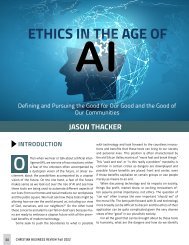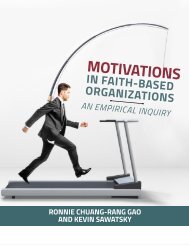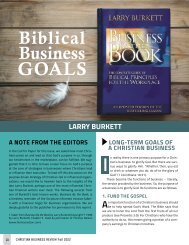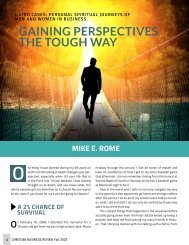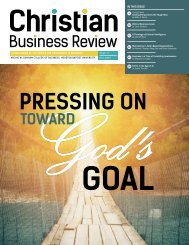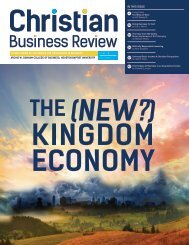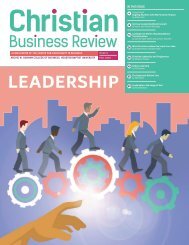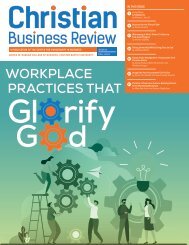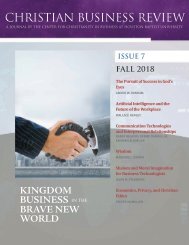Business in a Time of Escalating Lawlessness by Marjorie J. Cooper (CBR 2022)
You also want an ePaper? Increase the reach of your titles
YUMPU automatically turns print PDFs into web optimized ePapers that Google loves.
BUSINESS IN A TIME OF<br />
ESCALATING<br />
LAWLESSNESS<br />
*<br />
And because lawlessness<br />
will abound, the love <strong>of</strong> many<br />
will grow cold.<br />
ABSTRACT<br />
MATTHEW 24:12<br />
MARJORIE J. COOPER<br />
The escalation <strong>of</strong> spiritual lawlessness <strong>in</strong> American society, as well as <strong>in</strong> many parts <strong>of</strong> the world, fosters an <strong>in</strong>crease <strong>in</strong> poverty,<br />
crime, and disrespect for other human be<strong>in</strong>gs. This rebellion is particularly serious as it is directed toward God Himself,<br />
but its detrimental effects <strong>in</strong>evitably extend to every doma<strong>in</strong> <strong>of</strong> life, <strong>in</strong>clud<strong>in</strong>g economies. As a result, effective bus<strong>in</strong>ess<br />
communication, plann<strong>in</strong>g, projects, and supply cha<strong>in</strong>s become disrupted and <strong>in</strong>efficient. Costs rise, performance deteriorates,<br />
and people are less and less civil <strong>in</strong> their public discourse and <strong>in</strong>terpersonal <strong>in</strong>teractions. Christian bus<strong>in</strong>esspeople are<br />
uniquely qualified to address many <strong>of</strong> the bus<strong>in</strong>ess and social ills brought on <strong>by</strong> such lawlessness if they are will<strong>in</strong>g to consciously<br />
stand aga<strong>in</strong>st it and implement redemptive strategies to alleviate the effects <strong>of</strong> lawlessness. Whether <strong>in</strong> market<strong>in</strong>g<br />
communications, f<strong>in</strong>ancial matters, or employee and supplier relationships, Christians can br<strong>in</strong>g to bear the m<strong>in</strong>d <strong>of</strong> Christ<br />
and love for those that oppose them <strong>in</strong> ways that are not common <strong>in</strong> the world system. Christian bus<strong>in</strong>esspeople, wherever<br />
they work, can have a positive <strong>in</strong>fluence on their environment and a dampen<strong>in</strong>g effect on lawlessness.<br />
42<br />
CHRISTIAN BUSINESS REVIEW Fall <strong>2022</strong>
BUSINESS IN A TIME OF LAWLESSNESS<br />
<strong>CBR</strong> PEER REVIEWED ARTICLES<br />
“In those days there was no k<strong>in</strong>g <strong>in</strong> Israel; everyone did<br />
what was right <strong>in</strong> his own eyes”<br />
(Judg.17:6; 21:25).<br />
INTRODUCTION<br />
S<br />
uch is the essence <strong>of</strong> spiritual lawlessness. If everyone<br />
does what is right <strong>in</strong> his own eyes, then<br />
people have made themselves their own gods,<br />
unrestra<strong>in</strong>ed <strong>by</strong> accountability to an all-powerful<br />
deity. In a society dom<strong>in</strong>ated <strong>by</strong> such lawlessness, men<br />
and women claim unlimited self-determ<strong>in</strong>ation strictly as a<br />
function <strong>of</strong> their own predispositions and preferences; they<br />
grant no one else the moral authority to dictate otherwise,<br />
<strong>in</strong>clud<strong>in</strong>g the Creator and Susta<strong>in</strong>er <strong>of</strong> the universe.<br />
Not only is such belief destructive to the <strong>in</strong>dividual, if pervasive,<br />
it signals escalat<strong>in</strong>g decl<strong>in</strong>e and ru<strong>in</strong> throughout a<br />
culture via a variety <strong>of</strong> symptomatic manifestations. We can<br />
expect the deleterious effects <strong>of</strong> this spiritual lawlessness<br />
and impoverishment to be felt <strong>in</strong> every doma<strong>in</strong> <strong>of</strong> human<br />
endeavor: family, law, government, medic<strong>in</strong>e, education, religion,<br />
and others. One such symptom <strong>of</strong> spiritual lawlessness<br />
is the deterioration <strong>of</strong> factors conducive to a prosperous<br />
economy. As this condition escalates, it leads to losses<br />
that threaten the very basis for capitalism. Freedom under<br />
God creates opportunities that—<strong>in</strong> varied forms—reduced<br />
poverty and brought higher standards <strong>of</strong> liv<strong>in</strong>g through enhanced<br />
economic success and productivity to many countries<br />
around the world. Freedom apart from God <strong>in</strong>evitably moves<br />
toward anarchy.<br />
In this article, I first exam<strong>in</strong>e the biblical perspective on<br />
spiritual lawlessness, which results—both <strong>in</strong> the case <strong>of</strong> the<br />
lawless <strong>in</strong>dividual and <strong>in</strong> the case <strong>of</strong> a society made up <strong>of</strong> a<br />
critical mass <strong>of</strong> spiritually lawless citizens—<strong>in</strong> a variety <strong>of</strong><br />
undesirable effects across all human doma<strong>in</strong>s. I then briefly<br />
cite some evidence that spiritual lawlessness is an <strong>in</strong>creas<strong>in</strong>g<br />
threat to US society. F<strong>in</strong>ally, I discuss some possible ways<br />
that Christian bus<strong>in</strong>esspeople might frame their responses<br />
to mitigate the damage <strong>in</strong>flicted <strong>by</strong> rampant lawlessness and<br />
to advance redemptive measures for customers, suppliers,<br />
and employees as well as the culture at large.<br />
BIBLICAL PERSPECTIVES<br />
ON THE NATURE AND<br />
PRACTICE OF<br />
LAWLESSNESS<br />
LAWLESSNESS DEFINED<br />
The concept <strong>of</strong> lawlessness is expressed <strong>in</strong> the Old Testament<br />
<strong>by</strong> more than 20 different Hebrew words. However, the<br />
notion <strong>of</strong> unbelief and disobedience toward God pervades<br />
the underly<strong>in</strong>g thrust <strong>of</strong> these words, demonstrated <strong>in</strong> that<br />
the Septuag<strong>in</strong>t (LXX) uses only one Greek word, and <strong>in</strong> each<br />
case the word is the same word for lawlessness as used <strong>in</strong><br />
the New Testament. 1 That word (Gr. ἀνομία) means a “state<br />
or condition <strong>of</strong> be<strong>in</strong>g disposed to what is lawless” or “a lawless<br />
deed.” 2 It is important to note that necessarily a dependency<br />
exists between spiritual lawlessness and overt acts<br />
<strong>of</strong> lawlessness: A spiritually lawless m<strong>in</strong>d produces overtly<br />
lawless deeds.<br />
However, biblical teach<strong>in</strong>g on lawlessness is more all-encompass<strong>in</strong>g<br />
than merely cases <strong>of</strong> break<strong>in</strong>g civil or crim<strong>in</strong>al<br />
law. <strong>Lawlessness</strong>, which makes its first appearance <strong>in</strong> the<br />
garden, is, at its core, the condition <strong>of</strong> the human heart,<br />
which acts both <strong>in</strong> unbelief toward the word <strong>of</strong> God (Eve) and<br />
<strong>in</strong> conscious disobedience to God’s <strong>in</strong>struction (Adam) (1 Tim<br />
2:14). 3 As the Lord himself said, “The good man out <strong>of</strong> the<br />
good treasure <strong>of</strong> his heart br<strong>in</strong>gs forth what is good; and the<br />
evil man out <strong>of</strong> the evil treasure br<strong>in</strong>gs forth what is evil; for<br />
his mouth speaks from that which fills his heart” (Luke 6:45).<br />
Scripture gives us more detail about the nature <strong>of</strong> lawlessness.<br />
For example, John tells us that “Everyone who practices<br />
s<strong>in</strong> also practices lawlessness; and s<strong>in</strong> is lawlessness”<br />
(1 Jn 3:4), so we do not have to look very far to f<strong>in</strong>d lawlessness.<br />
It thrives <strong>in</strong> each <strong>of</strong> us, barr<strong>in</strong>g a faith commitment to<br />
Jesus Christ and the restra<strong>in</strong><strong>in</strong>g <strong>in</strong>fluence <strong>of</strong> the Holy Spirit<br />
with<strong>in</strong> each believer. Thus, lawlessness as def<strong>in</strong>ed biblically<br />
does not merely refer to obvious overt transgressions, although<br />
it certa<strong>in</strong>ly <strong>in</strong>cludes those. Rather, lawlessness is the<br />
manifestation <strong>of</strong> a s<strong>in</strong>ful heart and m<strong>in</strong>d that rejects God’s<br />
word and <strong>in</strong>struction to pursue <strong>in</strong>dependence and disobedience<br />
<strong>in</strong>stead.<br />
In contrast, believers <strong>in</strong> Christ, who are also his ambassadors<br />
to a world that <strong>in</strong>creas<strong>in</strong>gly advocates and portrays<br />
lawlessness, should present a completely different character<br />
and orientation to all aspects <strong>of</strong> life, <strong>in</strong>clud<strong>in</strong>g how they<br />
CHRISTIAN BUSINESS REVIEW Fall <strong>2022</strong> 432
BUSINESS IN A TIME OF LAWLESSNESS<br />
<strong>CBR</strong> PEER REVIEWED ARTICLES<br />
do bus<strong>in</strong>ess. Paul <strong>in</strong> Rom 12:2 commands a renewal <strong>of</strong> the<br />
m<strong>in</strong>d; the natural tendency <strong>of</strong> the flesh is toward lawlessness<br />
apart from the renovation work <strong>of</strong> the Holy Spirit. This<br />
is especially true if we seek to be conformed to the image <strong>of</strong><br />
Christ <strong>in</strong> every area <strong>of</strong> life. As Heb 1:9a says <strong>in</strong> highlight<strong>in</strong>g<br />
our Savior’s antipathy toward lawlessness, “Thou hast loved<br />
righteousness and hated lawlessness.”<br />
EVIDENCE OF ESCALATING<br />
LAWLESSNESS<br />
The thesis <strong>of</strong> this paper is that escalat<strong>in</strong>g lawlessness will <strong>in</strong>creas<strong>in</strong>gly<br />
impact the health <strong>of</strong> bus<strong>in</strong>esses and the economic<br />
prosperity that Americans have come to enjoy and expect.<br />
This thesis <strong>in</strong> no way claims that lawlessness is worse now<br />
than it has ever been throughout history nor that it is yet as<br />
bad as it could be. But it is the contention <strong>of</strong> this paper that<br />
we are see<strong>in</strong>g an <strong>in</strong>creas<strong>in</strong>g departure from the knowledge <strong>of</strong><br />
God <strong>in</strong> our culture as well as an <strong>in</strong>creas<strong>in</strong>g rejection <strong>of</strong> human<br />
responsibility to know<br />
and heed his precepts<br />
and commands. These<br />
departures portend<br />
<strong>in</strong>creas<strong>in</strong>g overt manifestations<br />
<strong>of</strong> lawless<br />
m<strong>in</strong>ds, which appear<br />
to this author to be<br />
obvious to anyone<br />
who engages with the<br />
culture. However, that<br />
contention is merely<br />
anecdotal; there<br />
is also research that<br />
supports the ongo<strong>in</strong>g<br />
rejection <strong>of</strong> biblical truth, which results <strong>in</strong> lawless beliefs, attitudes,<br />
and actions.<br />
In contrast to operat<strong>in</strong>g under the assumption that<br />
we as human be<strong>in</strong>gs are at least somewhat accountable to<br />
God, the <strong>in</strong>fluence <strong>of</strong> religion <strong>in</strong> general and Christianity <strong>in</strong><br />
particular appears to be wan<strong>in</strong>g <strong>in</strong> modern western societies.<br />
4 In contrast to the prevalence <strong>of</strong> the Protestant Ethic bestow<strong>in</strong>g<br />
considerable advantage on the economies <strong>of</strong> western<br />
society 5 , countervail<strong>in</strong>g op<strong>in</strong>ions <strong>in</strong>creas<strong>in</strong>gly question<br />
the positive <strong>in</strong>fluence <strong>of</strong> religion, notably, for our purposes<br />
here<strong>in</strong>, throughout the doma<strong>in</strong>s <strong>of</strong> economics and bus<strong>in</strong>ess.<br />
Callum Brown documents how <strong>in</strong> the span <strong>of</strong> less than forty<br />
years Brita<strong>in</strong> sent “organized Christianity <strong>in</strong>to a downward<br />
spiral to the marg<strong>in</strong>s <strong>of</strong> social significance.” 6 Hugh McLeod<br />
documents a similarly precipitous decl<strong>in</strong>e <strong>in</strong> Canada. 7<br />
Although the trend toward secularization <strong>in</strong> the United<br />
States, especially <strong>in</strong> the South, has been slower than <strong>in</strong> Canada<br />
and Europe, <strong>by</strong> the early 1990s, the overall percentage<br />
<strong>of</strong> declared secularists <strong>in</strong> the United States virtually mirrored<br />
the percentages <strong>of</strong> secularists <strong>in</strong> Canada and Brita<strong>in</strong> and<br />
shows no sign <strong>of</strong> abat<strong>in</strong>g. 8 Such a trajectory does not bode<br />
well for economic prosperity, which depends on a moral and<br />
ethical populace for its long-term viability.<br />
In George Barna’s American Worldview Inventory 2021-22,<br />
a variety <strong>of</strong> trends <strong>in</strong>dicate an <strong>in</strong>creas<strong>in</strong>g rejection <strong>of</strong> God and<br />
his truth. 9 Integrated Disciples is Barna’s term for those that<br />
believe “the Bible is the accurate and reliable words <strong>of</strong> God”;<br />
believe that an omnipotent, omniscient, and holy God rules<br />
the universe; and recognize God’s personal purpose for them<br />
as well as their obligation to make moral choices that honor<br />
God. 10 This is Barna’s def<strong>in</strong>ition <strong>of</strong> a biblical worldview, and,<br />
though one might quibble about the details, Barna’s def<strong>in</strong>ition<br />
is certa<strong>in</strong>ly a m<strong>in</strong>imum<br />
for a genu<strong>in</strong>ely<br />
<strong>Lawlessness</strong>, which makes its first<br />
appearance <strong>in</strong> the garden, is, at its<br />
core, the condition <strong>of</strong> the human<br />
heart, which acts both <strong>in</strong> unbelief<br />
toward the word <strong>of</strong> God (Eve) and<br />
<strong>in</strong> conscious disobedience to God’s<br />
<strong>in</strong>struction (Adam)<br />
“Christian” worldview.<br />
Unfortunately,<br />
only six percent <strong>of</strong><br />
Americans evidence<br />
these characteristics.<br />
Additionally, a<br />
biblical worldview<br />
shows consistent<br />
downward trends<br />
<strong>by</strong> younger age cohorts,<br />
lend<strong>in</strong>g credence<br />
to an escalat<strong>in</strong>g<br />
departure from<br />
adherence to biblical truth over time. 11 An absence <strong>of</strong> these<br />
beliefs <strong>in</strong>dicates not just a lack <strong>of</strong> biblical orientation but also<br />
the <strong>in</strong>trusion <strong>of</strong> an orientation toward lawlessness <strong>in</strong> belief<br />
and practice.<br />
Among those that self-identify as born-aga<strong>in</strong> Christians—28%<br />
or more than 1 <strong>in</strong> 4 Americans—56% say that<br />
hav<strong>in</strong>g faith matters more than which faith you pursue, and<br />
51% say that all religious faiths are <strong>of</strong> equal value. Such belief<br />
logically implies that the substitutionary atonement <strong>of</strong> Christ<br />
for s<strong>in</strong> is unnecessary for relationship with God. More than<br />
half, 54%, accept feel<strong>in</strong>gs, experience and the <strong>in</strong>put <strong>of</strong> friends<br />
and family as their most trusted sources <strong>of</strong> moral guidance<br />
rather than the Scriptures as ultimately authoritative. 12<br />
44<br />
CHRISTIAN BUSINESS REVIEW Fall <strong>2022</strong>
BUSINESS IN A TIME OF LAWLESSNESS<br />
<strong>CBR</strong> PEER REVIEWED ARTICLES<br />
We have ample evidence that a m<strong>in</strong>dset <strong>of</strong> lawlessness<br />
is <strong>in</strong>creas<strong>in</strong>gly manifest even with<strong>in</strong> the Christian community.<br />
A LifeWay Research study found only 45 percent <strong>of</strong> those<br />
who regularly attend church read the Bible more than once<br />
a week, and almost 20 percent <strong>of</strong> these churchgoers admit<br />
they never read the Bible. 13 If one is not familiar with the<br />
word <strong>of</strong> God, one can hardly be expected to obey it, and biblical<br />
illiteracy hampers the exercise <strong>of</strong> discernment and godly<br />
skill for liv<strong>in</strong>g, aga<strong>in</strong> leav<strong>in</strong>g the door open for the <strong>in</strong>trusion<br />
<strong>of</strong> lawless th<strong>in</strong>k<strong>in</strong>g.<br />
SOME PERVASIVE<br />
CHARACTERISTICS OF<br />
LAWLESSNESS<br />
LAWLESSNESS MEANS NO FEAR OF<br />
GOD<br />
One def<strong>in</strong><strong>in</strong>g characteristic <strong>of</strong> lawlessness is a lack <strong>of</strong> healthy<br />
fear <strong>of</strong> God. Although to “fear” <strong>in</strong> the Old Testament can simply<br />
mean a visceral fright that is unconnected to true faith,<br />
these <strong>in</strong>stances number fewer than a dozen, and some <strong>of</strong><br />
those are disputed. However, accord<strong>in</strong>g to Albert N. Mart<strong>in</strong>,<br />
there are between 150 to 175 explicit references to the fear<br />
<strong>of</strong> God <strong>in</strong> the Old Testament. Coupled with <strong>in</strong>stances <strong>in</strong> which<br />
the fear <strong>of</strong> God is illustrated, though not explicitly stated,<br />
these examples can be counted <strong>in</strong> the hundreds. 14 In each<br />
case the idea is one <strong>of</strong> faith and obedience toward God, as,<br />
for example, <strong>in</strong> the case <strong>of</strong> the Israelite midwives <strong>in</strong> Egypt<br />
(Exod 1:17, 20) or when Nehemiah promotes Hananiah (Neh<br />
7:2), because he demonstrated fear <strong>of</strong> God. Similar usage can<br />
be found <strong>in</strong> the Second Temple literature and <strong>in</strong> the New Testament<br />
up to and <strong>in</strong>clud<strong>in</strong>g Acts 13. 15 Thus, Scripture gives<br />
unequivocal testimony that a spiritually healthy person and<br />
society will exhibit the fear <strong>of</strong> God <strong>by</strong> adher<strong>in</strong>g to his commands<br />
and respect<strong>in</strong>g his moral authority to govern all human<br />
<strong>in</strong>stitutions.<br />
The fear <strong>of</strong> God is the opposite <strong>of</strong> each person do<strong>in</strong>g what<br />
is right <strong>in</strong> her own eyes. Instead <strong>of</strong> be<strong>in</strong>g accountable to no<br />
one, people who fear God recognize their accountability to<br />
the transcendent judge, whose rule is both authoritative and<br />
essential for human well-be<strong>in</strong>g. The fear <strong>of</strong> God thus constra<strong>in</strong>s<br />
behavior and, at a m<strong>in</strong>imum, causes people to curb<br />
their worst impulses, deem<strong>in</strong>g it foolhardy to run afoul <strong>of</strong> the<br />
Judge <strong>of</strong> the universe and suffer the consequences he dispenses.<br />
In practice, then, the fear <strong>of</strong> God reflects an understand<strong>in</strong>g<br />
<strong>of</strong> Paul’s warn<strong>in</strong>g <strong>in</strong> Gal 6:7, “Do not be deceived,<br />
God is not mocked; for whatever a [person] sows, this [he<br />
or she] will also reap.” Rather than reap the consequences,<br />
those who fear God will <strong>of</strong>ten (but not always) choose to<br />
adhere to his moral standards and norms, even when under<br />
pressure to do otherwise.<br />
By coupl<strong>in</strong>g lawlessness with impurity (or uncleanness) <strong>in</strong><br />
Rom 6:19 16 , the Apostle Paul verifies the l<strong>in</strong>kage between a<br />
state <strong>of</strong> <strong>in</strong>dividual s<strong>in</strong> and widespread moral corruption. He<br />
also portrays the repetitive choice to be a slave to impurity<br />
and lawlessness as a recipe for an escalat<strong>in</strong>g downward spiral<br />
<strong>in</strong> terms <strong>of</strong> more and more lawlessness. That uncleanness<br />
is associated with lawlessness shows that moral impurity<br />
has consequences beyond the corruption <strong>of</strong> the <strong>in</strong>dividual<br />
alone. Rather, moral impurity is associated with the lawlessness<br />
that tears away at the fabric <strong>of</strong> society, ripp<strong>in</strong>g apart<br />
God’s established <strong>in</strong>stitutions and provisions for human<br />
flourish<strong>in</strong>g. Impurity or uncleanness and lawlessness are<br />
contrasted <strong>by</strong> Paul <strong>in</strong> Rom 6:19 with righteousness lead<strong>in</strong>g<br />
to sanctification, which is the desired end-state <strong>of</strong> Christ’s<br />
work <strong>in</strong> believers.<br />
Therefore, <strong>in</strong> view <strong>of</strong> these very real pitfalls, Christian<br />
bus<strong>in</strong>esspeople do well to cultivate honest messag<strong>in</strong>g to<br />
consumers, honor<strong>in</strong>g their promises as well as ensur<strong>in</strong>g good<br />
value <strong>in</strong> the products they produce and market. If Christians<br />
<strong>in</strong> the bus<strong>in</strong>ess community mislead their customers and<br />
suppliers and cannot be trusted, they have bowed to cultural<br />
lawlessness, because research shows that trust and cooperative<br />
behavior is essential for bus<strong>in</strong>ess relationships to<br />
prosper. 17<br />
LAWLESSNESS RESULTS IN CHAOS<br />
A general axiom is that God is not a god <strong>of</strong> confusion and<br />
chaos (1Cor 14:33). Wherever we f<strong>in</strong>d genu<strong>in</strong>e fear <strong>of</strong> God<br />
and respect for God’s rule, we also f<strong>in</strong>d God’s people at work<br />
restor<strong>in</strong>g peace and order. <strong>Lawlessness</strong> foments chaos,<br />
darkness, and hopelessness. From an economic perspective<br />
its presence also thwarts order, stability, and efficient<br />
production processes as well as reliable delivery and schedul<strong>in</strong>g.<br />
Many <strong>of</strong> the current disruptions <strong>in</strong> supply cha<strong>in</strong>s are<br />
the result <strong>of</strong> chaos, bottlenecks, and lawless disruptions. 18<br />
<strong>Bus<strong>in</strong>ess</strong>es cannot thrive under conditions <strong>of</strong> chaos; <strong>in</strong><br />
fact, virtually no human enterprise thrives <strong>in</strong> the presence<br />
<strong>of</strong> lawlessness and its accompany<strong>in</strong>g disruptions <strong>in</strong> order,<br />
productivity, and logistics. The Christian’s redemptive role <strong>in</strong><br />
CHRISTIAN BUSINESS REVIEW Fall <strong>2022</strong> 452
BUSINESS IN A TIME OF LAWLESSNESS<br />
<strong>CBR</strong> PEER REVIEWED ARTICLES<br />
response to lawlessness is partly to restore order, reliability,<br />
and improved functionality to various entities that have<br />
been contam<strong>in</strong>ated <strong>by</strong> the destructive effects <strong>of</strong> lawlessness<br />
and rebellion aga<strong>in</strong>st God’s order. As an example, Christian<br />
bus<strong>in</strong>esspeople who have been tra<strong>in</strong>ed to assess disruptions<br />
<strong>in</strong> the supply cha<strong>in</strong>, reduce the variability and uncerta<strong>in</strong>ty <strong>of</strong><br />
supply cha<strong>in</strong> performance, and improve coord<strong>in</strong>ation and cooperation<br />
are do<strong>in</strong>g a great service.<br />
LAWLESSNESS AND NO COMPASSION<br />
FOR THE DISADVANTAGED<br />
Proverbs 21:10 reads, “The soul <strong>of</strong> the wicked desires evil;<br />
his neighbor f<strong>in</strong>ds no favor <strong>in</strong> his eyes.” <strong>Lawlessness</strong> does<br />
not deal <strong>in</strong> compassion and sacrifice for others. Its every expression<br />
reflects self-seek<strong>in</strong>g and personal agenda, even evil<br />
<strong>in</strong>tent. That, <strong>of</strong> course, is one <strong>of</strong> the reasons lawlessness is<br />
so deceptive and persuasive to the naïve and those without<br />
spiritual discernment. The plans <strong>of</strong> the lawless <strong>of</strong>ten sound<br />
reasonable, rational, and positive <strong>in</strong> a utilitarian sense. But as<br />
Isaiah declares, the lawless one is disposed to keep the hungry<br />
person unsatisfied and to deprive the thirsty person <strong>of</strong><br />
dr<strong>in</strong>k (Isa 32:6). Therefore, Christian bus<strong>in</strong>esspeople need to<br />
exercise godly wisdom <strong>in</strong> choos<strong>in</strong>g their bus<strong>in</strong>ess associates<br />
that they may not become caught up <strong>in</strong> a web <strong>of</strong> selfishness<br />
and exploitation. Christian bus<strong>in</strong>esspeople can also use their<br />
well-honed bus<strong>in</strong>ess skills to organize efforts to afford the<br />
disadvantaged genu<strong>in</strong>e hope and assistance.<br />
LAWLESSNESS AND POOR DECISION-<br />
MAKING<br />
In Romans 1, Paul del<strong>in</strong>eates a process <strong>by</strong> which rejection <strong>of</strong><br />
God and moral corruption begets a downward spiral <strong>in</strong> both<br />
spiritual sensitivity and <strong>in</strong> mental acuity. First is the suppression<br />
<strong>of</strong> the truth <strong>in</strong> unrighteousness (v. 18); next is the<br />
conscious rejection <strong>of</strong> what human be<strong>in</strong>gs naturally know<br />
about God (v. 21), which leads to those becom<strong>in</strong>g fools who<br />
believe they are wise (v. 22); and f<strong>in</strong>ally results <strong>in</strong> believ<strong>in</strong>g<br />
a lie (v. 25) and hav<strong>in</strong>g a depraved m<strong>in</strong>d (v. 28). Under such<br />
conditions, human be<strong>in</strong>gs are <strong>in</strong>capable <strong>of</strong> see<strong>in</strong>g situations<br />
clearly and rationally; they are also impaired <strong>in</strong> everyday decision-mak<strong>in</strong>g,<br />
<strong>in</strong>clud<strong>in</strong>g bus<strong>in</strong>ess decisions, because they<br />
have rejected reality to embrace that which is not real.<br />
Faulty decision-mak<strong>in</strong>g is the <strong>in</strong>evitable consequence.<br />
One <strong>of</strong> the more humorous examples <strong>of</strong> <strong>in</strong>ability to foresee<br />
the logical conclusions <strong>of</strong> action <strong>in</strong>itiatives is Seattle’s recent<br />
soda tax. In 2018, Seattle mandated a tax on s<strong>of</strong>t dr<strong>in</strong>ks and<br />
other sugary dr<strong>in</strong>ks. The <strong>in</strong>tent was to improve the health <strong>of</strong><br />
Seattle residents. With<strong>in</strong> two years, it became evident that<br />
many residents had forsaken sugary dr<strong>in</strong>ks for beer. Alcohol<br />
consumption, as we know, contributes to a wide range<br />
<strong>of</strong> health problems, not to mention the social problems fostered<br />
<strong>by</strong> excessive beer consumption. But the problem <strong>of</strong><br />
obesity, which the tax was orig<strong>in</strong>ally <strong>in</strong>tended to address<br />
rema<strong>in</strong>ed unaffected. 19 This situation, although trivial, illustrates<br />
the flaws <strong>in</strong> us<strong>in</strong>g utilitarian objectives as the criteria<br />
for action. Apart from the omniscient hand <strong>of</strong> God direct<strong>in</strong>g<br />
human plann<strong>in</strong>g and solutions, the consequences are <strong>of</strong>ten<br />
“un<strong>in</strong>tended” and more destructive than the <strong>in</strong>itial problem.<br />
When human be<strong>in</strong>gs reject what they know to be true<br />
about God and embrace <strong>in</strong>stead lawlessness and s<strong>in</strong>, the<br />
solutions they propose are likely to lead to even more disruption<br />
<strong>in</strong> bus<strong>in</strong>ess, government, medic<strong>in</strong>e, and every other human<br />
endeavor. In contrast, Psalm 119:98-100 <strong>of</strong>fers these<br />
encourag<strong>in</strong>g words, “Thy commandments make me wiser<br />
than my enemies, for they are ever m<strong>in</strong>e. I have more <strong>in</strong>sight<br />
than all my teachers, for Thy testimonies are my meditation.<br />
I understand more than the aged, because I have observed<br />
Thy precepts.”<br />
HOW CHRISTIAN<br />
BUSINESSPEOPLE CAN<br />
RESPOND<br />
RESPONSES THAT REFLECT THE<br />
LORD’S COMMANDS<br />
As a first step toward respond<strong>in</strong>g to lawlessness <strong>in</strong> the<br />
bus<strong>in</strong>ess community, Christian bus<strong>in</strong>esspeople might take<br />
personal <strong>in</strong>ventory and check their response to perceived<br />
<strong>in</strong>justice and unethical behaviors. A good place to test oneself<br />
for godly response is <strong>in</strong> the context <strong>of</strong> daily bus<strong>in</strong>ess activities,<br />
where cooperation and mutual respect are essential<br />
for success, but where many disagreements and compla<strong>in</strong>ts<br />
are aired. Incivility <strong>in</strong> the workplace is on the rise 20 and has<br />
been shown to have numerous deleterious effects. For example,<br />
nurses report <strong>in</strong>civility can even impact patient care<br />
<strong>in</strong> a medical sett<strong>in</strong>g. 21 Incivility is one symptom <strong>of</strong> escalat<strong>in</strong>g<br />
lawless predisposition <strong>in</strong> society, s<strong>in</strong>ce it conveys disrespect<br />
for others made <strong>in</strong> the image <strong>of</strong> God and ignores God’s mandates<br />
for do<strong>in</strong>g unto others as we would have others do unto<br />
46<br />
CHRISTIAN BUSINESS REVIEW Fall <strong>2022</strong>
BUSINESS IN A TIME OF LAWLESSNESS<br />
<strong>CBR</strong> PEER REVIEWED ARTICLES<br />
us. Incivility is a classic example <strong>of</strong> violation <strong>of</strong> the second<br />
commandment and thus qualifies as an overt expression <strong>of</strong><br />
lawlessness. The workplace with its tensions and pressures<br />
can be an open opportunity for believers to exhibit graciousness<br />
and k<strong>in</strong>dness (Gal 5:22-23) amidst these disruptions.<br />
Unfortunately, many Christians respond <strong>in</strong> anger and<br />
frustration to various aspects <strong>of</strong> lawlessness, which is an<br />
understandable human response. However, the Lord’s people<br />
are called to ev<strong>in</strong>ce a demeanor that owes its self-control<br />
to Someone greater than ourselves. We must go well beyond<br />
the natural human responses to external threats. Regrettably,<br />
the emotional tenor <strong>of</strong> discourse from Christians <strong>in</strong> many<br />
bus<strong>in</strong>ess sett<strong>in</strong>gs is frustration, aggression, and even retaliation,<br />
which constitute overt acts <strong>of</strong> lawlessness.<br />
In contrast, Paul writes <strong>in</strong> 2 Tim 2:24-26, “And the Lord’s<br />
bondservant must<br />
not be quarrelsome,<br />
but be k<strong>in</strong>d to all,<br />
able to teach, patient<br />
when wronged,<br />
with gentleness correct<strong>in</strong>g<br />
those who<br />
are <strong>in</strong> opposition, if<br />
perhaps God may<br />
grant them repentance<br />
lead<strong>in</strong>g to the<br />
knowledge <strong>of</strong> the<br />
truth, and they may<br />
come to their senses<br />
and escape from the<br />
snare <strong>of</strong> the devil,<br />
hav<strong>in</strong>g been held captive <strong>by</strong> him to do his will.”<br />
The Lord himself tells us <strong>in</strong> Matt 5:44-45 to love our enemies<br />
and pray for those who persecute us. This is God’s clear<br />
command, that Christians should not take a page from the<br />
lawlessness handbook, but rather than retaliat<strong>in</strong>g <strong>in</strong> k<strong>in</strong>d, we<br />
should be sufficiently countercultural that the contrast is noticeable<br />
and appreciated.<br />
In cases where Christian bus<strong>in</strong>esspeople are criticized for<br />
their beliefs and ethical stands on various issues, there are<br />
ways to address lawlessness that does not <strong>in</strong>flame opposition<br />
and that shows the immense contributions that Christianity<br />
makes to a culture. As an example, <strong>in</strong> the early days<br />
<strong>of</strong> the church, Christians were <strong>of</strong>ten accused <strong>of</strong> terrible s<strong>in</strong>s,<br />
such as gross immorality and <strong>in</strong>cest, cannibalism, and engag<strong>in</strong>g<br />
<strong>in</strong> traitorous acts aga<strong>in</strong>st Caesar, to name but a few.<br />
The early apologists were those who spoke out and carefully<br />
presented true Christian beliefs and practices to a pagan<br />
world that not only misunderstood them but was disposed<br />
to persecute them for those “practices.” Just<strong>in</strong> Martyr, Tertullian,<br />
and Clement <strong>of</strong> Alexandria, for example, earnestly presented<br />
alternatives to the prevail<strong>in</strong>g mis<strong>in</strong>formation about<br />
Christians, carefully reasoned and respectful towards the<br />
audiences to which these treatises were directed.<br />
The conduct <strong>of</strong> those early Christians was also testimony<br />
to their superior contributions to the Roman Empire, as, for<br />
example, the extent to which Christians cared for the sick.<br />
Devastat<strong>in</strong>g epidemics swept the Roman Empire <strong>in</strong> CD 165<br />
and aga<strong>in</strong> <strong>in</strong> 251. We can only speculate as to what diseases<br />
these were, although many suggest smallpox and measles.<br />
Estimates vary, but it is likely that a quarter to a third <strong>of</strong> the<br />
population died <strong>in</strong> the first epidemic and as many as 5,000<br />
a day were dy<strong>in</strong>g <strong>in</strong><br />
Rome at the height <strong>of</strong><br />
The fear <strong>of</strong> God is the opposite<br />
<strong>of</strong> each person do<strong>in</strong>g what is right<br />
<strong>in</strong> her own eyes. Instead <strong>of</strong> be<strong>in</strong>g<br />
accountable to no one, people who<br />
fear God recognize their accountability<br />
to the transcendent judge, whose rule<br />
is both authoritative and essential for<br />
human well-be<strong>in</strong>g<br />
the latter epidemic. 22<br />
Dionysius <strong>of</strong> Alexandria,<br />
quoted <strong>by</strong> Eusebius,<br />
23 states that<br />
Christians at the time<br />
viewed the epidemic<br />
as a time <strong>of</strong> “school<strong>in</strong>g<br />
and test<strong>in</strong>g.” While<br />
many pagans fled the<br />
scene, the Christians<br />
“heedless <strong>of</strong> danger,”<br />
took charge <strong>of</strong> nurs<strong>in</strong>g<br />
the sick and m<strong>in</strong>ister<strong>in</strong>g<br />
to them <strong>in</strong> the<br />
name <strong>of</strong> Christ. Thus, the early Christians <strong>in</strong>spire us with their<br />
articulate defense <strong>of</strong> the faith and their unselfish response<br />
to the needs <strong>of</strong> their pagan neighbors. Christian healthcare<br />
organizations, which today are primarily run as for-pr<strong>of</strong>it<br />
bus<strong>in</strong>esses, can <strong>of</strong>fer similar efforts to alleviate suffer<strong>in</strong>g <strong>in</strong><br />
addition to their for-pr<strong>of</strong>it products and services. This is the<br />
sort <strong>of</strong> m<strong>in</strong>dset and sacrifice needed to <strong>of</strong>fset spiritual lawlessness<br />
and to br<strong>in</strong>g the heal<strong>in</strong>g and redemptive message<br />
<strong>of</strong> Christ to a world that views Christians with <strong>in</strong>creas<strong>in</strong>g antipathy.<br />
CONTEMPORARY RESPONSES THAT<br />
REFLECT GODLY SACRIFICE<br />
Christian bus<strong>in</strong>esspeople have much to contribute to curb<strong>in</strong>g<br />
lawlessness <strong>in</strong> ways that reflect their ambassadorship<br />
CHRISTIAN BUSINESS REVIEW Fall <strong>2022</strong> 472
BUSINESS IN A TIME OF LAWLESSNESS<br />
<strong>CBR</strong> PEER REVIEWED ARTICLES<br />
for Christ. Follow<strong>in</strong>g are some examples <strong>of</strong> positive contributions<br />
to society for which bus<strong>in</strong>esspeople are especially<br />
skilled and experienced. These are only a few ideas, some <strong>of</strong><br />
which are already be<strong>in</strong>g enacted and others that hold much<br />
potential for good.<br />
Christian bus<strong>in</strong>esspeople can be strong role models to<br />
bus<strong>in</strong>ess students, testify<strong>in</strong>g that it is possible to act both<br />
redemptively and unselfishly if one’s bus<strong>in</strong>ess and/or career<br />
are wholly submitted to Christ’s lordship. This would be a<br />
positive message for Christian young people today who may<br />
sometimes feel overwhelmed <strong>by</strong> the forces arrayed aga<strong>in</strong>st<br />
the Lord and his people.<br />
Christian bus<strong>in</strong>esspeople can <strong>in</strong>dividually or cooperatively<br />
collaborate to fund mission trips that provide bus<strong>in</strong>ess assistance<br />
and a Christian orientation to <strong>in</strong>digenous entrepreneurs.<br />
Often groups that struggle with poverty are receptive<br />
and thankful for help from Christian bus<strong>in</strong>ess groups that are<br />
formed to act redemptively—and without personal ga<strong>in</strong> and<br />
advantage—<strong>in</strong> disadvantaged regions <strong>of</strong> the world.<br />
With<strong>in</strong> one’s own country, it is possible to form co-ops <strong>of</strong><br />
Christian bus<strong>in</strong>esspeople to address problems among disadvantaged<br />
and struggl<strong>in</strong>g local neighborhoods. Some examples<br />
would be to organize projects to address the problem<br />
<strong>of</strong> food deserts or programs to upgrade the skillsets <strong>of</strong> unskilled<br />
workers, so that they can qualify for better jobs.<br />
Shortages <strong>of</strong> skilled trade workers have recently emerged<br />
<strong>in</strong> such critical fields as construction, heat<strong>in</strong>g and air condition<strong>in</strong>g,<br />
plumb<strong>in</strong>g, and others. 24 To address the shortage <strong>of</strong><br />
welders, a heavy-metal band has <strong>in</strong>itiated a program to substantially<br />
subsidize community college programs and students<br />
who ga<strong>in</strong> hands-on career tra<strong>in</strong><strong>in</strong>g <strong>in</strong> weld<strong>in</strong>g. 25 Certa<strong>in</strong>ly<br />
the band has no known Christian affiliation. However,<br />
the support <strong>of</strong> much-needed vocational programs to tra<strong>in</strong><br />
skilled workers for successful careers <strong>in</strong> the name <strong>of</strong> Christ<br />
is a model that Christian bus<strong>in</strong>esses and Christian bus<strong>in</strong>esspeople<br />
could adapt and sponsor.<br />
Christian bus<strong>in</strong>esspeople may volunteer to teach bus<strong>in</strong>ess<br />
skills to those who are <strong>in</strong>carcerated, thus decreas<strong>in</strong>g recidivism<br />
rates and <strong>in</strong>creas<strong>in</strong>g the likelihood that <strong>in</strong>mates will be<br />
able to thrive and prosper when they are released. Personal<br />
<strong>in</strong>volvement may be one contribution; another could be organiz<strong>in</strong>g<br />
funds to support these programs to show the love <strong>of</strong><br />
Christ <strong>in</strong> a particularly dismal place.<br />
In the wake <strong>of</strong> the US Supreme Court’s decision to overturn<br />
Roe v. Wade, a number <strong>of</strong> secular companies <strong>in</strong>stituted<br />
policies to pay employees’ expenses to travel to states that<br />
allow abortion and to pay the cost <strong>of</strong> this procedure. In stark<br />
contrast, Buffer Insurance <strong>in</strong> Southlake, Texas <strong>in</strong>stituted a<br />
policy <strong>of</strong> its own for employees. Buffer vowed to pay medical<br />
bills for its employees who want to have their babies and<br />
see the pregnancy to full term. 26 Such <strong>in</strong>itiatives are possible<br />
when Christian bus<strong>in</strong>esspeople dedicate themselves to<br />
shar<strong>in</strong>g the message <strong>of</strong> redemption <strong>in</strong> ways that are positive,<br />
car<strong>in</strong>g, organized, and self-sacrific<strong>in</strong>g.<br />
CONCLUSION<br />
Christian bus<strong>in</strong>esspeople have much to contribute to <strong>in</strong>itiatives<br />
that combat lawlessness. Some are good at forg<strong>in</strong>g<br />
persuasive promotional messages; others at conceiv<strong>in</strong>g<br />
creative strategies to advance redemptive projects; and still<br />
others at implement<strong>in</strong>g plans or rais<strong>in</strong>g funds to support<br />
those plans. Instead <strong>of</strong> rag<strong>in</strong>g at the world system, Christian<br />
bus<strong>in</strong>esspeople can <strong>of</strong>fer solutions that solve many <strong>of</strong> the<br />
problems that lawlessness creates. In this way, they demonstrate<br />
the love <strong>of</strong> Christ to a world liv<strong>in</strong>g <strong>in</strong> <strong>in</strong>creas<strong>in</strong>g hopelessness.<br />
ABOUT THE AUTHOR<br />
MARJORIE J. COOPER is<br />
Pr<strong>of</strong>essor <strong>of</strong> Market<strong>in</strong>g at Baylor<br />
University <strong>in</strong> Waco, Texas, where<br />
she has taught for 38 years. Dr.<br />
<strong>Cooper</strong> has published more than<br />
50 articles <strong>in</strong> refereed journals, <strong>in</strong>clud<strong>in</strong>g the<br />
Journal <strong>of</strong> Market<strong>in</strong>g, Journal <strong>of</strong> Advertis<strong>in</strong>g,<br />
Journal <strong>of</strong> Advertis<strong>in</strong>g Research, Journal <strong>of</strong><br />
<strong>Bus<strong>in</strong>ess</strong> Research, Journal <strong>of</strong> the Academy<br />
<strong>of</strong> Market<strong>in</strong>g Science, Industrial Market<strong>in</strong>g<br />
Management, Journal <strong>of</strong> Psychology & Theology,<br />
and Journal <strong>of</strong> <strong>Bus<strong>in</strong>ess</strong> Ethics among others.<br />
She has also published more than 100 bus<strong>in</strong>essrelated<br />
articles <strong>in</strong> practitioner publications, and<br />
she is currently the Editor for the Keller Center<br />
Research Report published <strong>by</strong> the Keller Center for<br />
Research at Baylor University. Her Ph.D. is from<br />
Texas A&M University, and she has a Th.M. from<br />
Dallas Theological Sem<strong>in</strong>ary.<br />
48<br />
CHRISTIAN BUSINESS REVIEW Fall <strong>2022</strong>
BUSINESS IN A TIME OF LAWLESSNESS<br />
<strong>CBR</strong> PEER REVIEWED ARTICLES<br />
NOTES<br />
1<br />
Philip H. Towner, “<strong>Lawlessness</strong>,” <strong>in</strong> Walter A. Elwell (Ed.), Baker’s<br />
Evangelical Dictionary <strong>of</strong> Biblical Theology (Grand Rapids, MI: Baker<br />
Books, 1996), p-p.<br />
2<br />
Walter Bauer, A Greek-English Lexicon <strong>of</strong> the New Testament and<br />
Other Early Christian Literature. Revised and edited <strong>by</strong> Frederick W.<br />
Danker, 3rd ed. (Chicago: University <strong>of</strong> Chicago Press, 2000), 85.<br />
3<br />
See <strong>Marjorie</strong> J. <strong>Cooper</strong>, “The Prohibition <strong>in</strong> 1 Timothy 2:12 <strong>in</strong> Light<br />
<strong>of</strong> Eve’s Hav<strong>in</strong>g Been Deceived (1 Tim 2:14-15),” Pres<strong>by</strong>terion, 44<br />
(2018): 115-125 for a discussion <strong>of</strong> Eve’s deception fueled <strong>by</strong> unbelief<br />
contrasted with Adam’s conscious disobedience.<br />
4<br />
R. F. Inglehart, “Giv<strong>in</strong>g Up on God: The Global Decl<strong>in</strong>e <strong>of</strong> Religion,”<br />
Foreign Affairs 99 (2020): 110-118.<br />
5<br />
See, for example, Max Weber. The Protestant Work Ethic and the<br />
Spirit <strong>of</strong> Capitalism. (New York: Vigeo Press Repr<strong>in</strong>t, 1930 [2017]).<br />
6<br />
Callum G. Brown. The Death <strong>of</strong> Christian Brita<strong>in</strong>: Understand<strong>in</strong>g Secularisation<br />
1800-2000 (London: Routledge, 2001), 1.<br />
7<br />
Hugh McLeod, “The Crisis <strong>of</strong> Christianity <strong>in</strong> the West: Enter<strong>in</strong>g<br />
a post-Christian Era?” <strong>in</strong> H. McLeod (Ed.), The Cambridge History <strong>of</strong><br />
Christianity: World Christianities c. 1914 – c. 2000 (Cambridge, UK:<br />
Cambridge University Press, 2008), 323-347.<br />
8<br />
Ibid.<br />
9<br />
George Barna, American Worldview Inventory 2021-22: The Annual<br />
Report on the State <strong>of</strong> Worldview <strong>in</strong> the United States, (Glendale, AZ:<br />
Arizona Christian University Press, <strong>2022</strong>).<br />
10<br />
Ibid, 68.<br />
11<br />
Ibid, 85-96.<br />
12<br />
Ibid, 66-67.<br />
13<br />
Ed Stetzer, “The Epidemic <strong>of</strong> Bible Illiteracy <strong>in</strong> Our Churches,”<br />
Christianity Today, accessed March 29, 2018, http: /www.christianitytoday.com/edstetzer/2015/july/epidemic-<strong>of</strong>-bible-illiteracy-<strong>in</strong>-our-churches.html.<br />
14<br />
A. N. Mart<strong>in</strong>. The Forgotten Fear: Where Have All the God-fearers<br />
Gone? (Grand Rapids, MI: Reformation Heritage Books, 2015), 1-2.<br />
15<br />
See <strong>Marjorie</strong> J. <strong>Cooper</strong>, “Theological Perspectives on the God-Fearers<br />
with Application to Acts 13:48,” Pres<strong>by</strong>terion, 46 (2020): 90-99<br />
for an explanation <strong>of</strong> the term<strong>in</strong>ation after Acts 13 <strong>of</strong> the phrase<br />
“God-fearers.”<br />
16<br />
All scripture quotations are from the NASB.<br />
17<br />
Robert M. Morgan and Shel<strong>by</strong> D. Hunt, “The Commitment-Trust<br />
Theory <strong>of</strong> Relationship Market<strong>in</strong>g,” Journal <strong>of</strong> Market<strong>in</strong>g, 58 (July<br />
1994): 20-38; Neve Isaeva, Kira Gruenewald, and Mark N. K. Saunders,<br />
“Trust Theory and Customer Services Research: Theoretical<br />
Review and Synthesis,” The Service Industries Journal, 2020, 40, Nos.<br />
15-16, 1031-1063 Https: /doi.org/10.1080/02642069.2020.1779<br />
225.<br />
18<br />
Lida Lacy, “Supply Cha<strong>in</strong> Issues Are Com<strong>in</strong>’ To Town,” Adweek, 62<br />
(November 15, 2021): 8-9.<br />
19<br />
Brad Polumbo, “Seattle’s Nanny-State Soda Tax Backfired Spectacularly<br />
(And Hilariously) New Study Shows,” Foundation for Economic<br />
Education, accessed February 17, <strong>2022</strong>, https: /fee.org/<br />
articles/seattle-s-nanny-state-soda-tax-backfired-spectacularly-and-hilariously-new-study-shows/?utm_source=facebook&utm_medium=social&utm_campaign=facebook_zapier&fbclid=IwAR0zsuLQnNUsAnMWtZQu3-SZcx7RlkI2dCQa_m9aSCmAg87F2EkH--9hw_o<br />
20<br />
L. Andersson and C. Pearson, “Tit for Tat? The Spiral<strong>in</strong>g Effect<br />
<strong>of</strong> Incivility <strong>in</strong> the Workplace,” Academy <strong>of</strong> Management Review, 24<br />
(1999): 452-471; L. Cort<strong>in</strong>a et al., “Incivility <strong>in</strong> the Workplace: Incidence<br />
and Impact,” Journal <strong>of</strong> Occupational Health Psychology, 6<br />
(2001): 64-80.<br />
21<br />
Mitchell J. Neubert et al., “Model<strong>in</strong>g Character: Servant leaders,<br />
Incivility and Patient Outcomes,” Journal <strong>of</strong> <strong>Bus<strong>in</strong>ess</strong> Ethics, 178<br />
(June, <strong>2022</strong>): 261-278.<br />
22<br />
Rodney Stark. The Rise <strong>of</strong> Christianity. (San Francisco: HarperSan-<br />
Francisco, 1997), 76-77.<br />
23<br />
Eusebius, Ecclesiastical History,7.22, 1965 ed.<br />
24<br />
Stanley Black & Decker, Research Report, accessed July 23, <strong>2022</strong>,<br />
https://www.prnewswire.com/news-releases/drill<strong>in</strong>g-<strong>in</strong>to-theskilled-trades-shortage-stanley-black--deckers-<strong>in</strong>augural-makers-<strong>in</strong>dex-reveals-few-students-likely-to-consider-a-career-<strong>in</strong>the-trades-outdated-perceptions-key-drivers-301517854.html<br />
25<br />
Melissa Frick, “Heavy Metal Band Metallica Funds Weld<strong>in</strong>g Program<br />
<strong>in</strong> Grand Rapids for 4th Straight Year,” accessed July 23, <strong>2022</strong>,<br />
https: /www.mlive.com/news/grand-rapids/<strong>2022</strong>/07/heavy-met-<br />
al-band-metallica-funds-weld<strong>in</strong>g-program-<strong>in</strong>-grand-rapids-for-<br />
4th-straight-year.html<br />
26<br />
Amy Furr, “Texas Company to Pay Medical Costs for Workers Who<br />
Have Babies <strong>in</strong> Response to Roe v. Wade Decision,” accessed July 1,<br />
<strong>2022</strong>, https: /www.breitbart.com/health/<strong>2022</strong>/07/03/texas-company-pay-medical-costs-workers-babies-response-roe-v-wadedecision/?utm_source=Breitbart&utm_medium=L<strong>in</strong>kedIn&utm_<br />
campaign=prolife<br />
CHRISTIAN BUSINESS REVIEW Fall <strong>2022</strong> 492




